|
|
|
Sort Order |
|
|
|
Items / Page
|
|
|
|
|
|
|
| Srl | Item |
| 1 |
ID:
012895


|
|
|
|
|
| Publication |
1997.
|
| Description |
38-49
|
|
|
|
|
|
|
|
|
|
|
|
|
|
|
|
| 2 |
ID:
079234
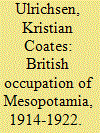

|
|
|
|
|
| Publication |
2007.
|
| Summary/Abstract |
During World War I the military campaign in Mesopotamia placed enormous demands on local man- and animal power to provide the logistical resources vital to its conduct. This required the British civil and military authorities to construct a wartime state apparatus that filled the administrative vacuum left by the retreating Ottomans and made possible its downward penetration and mobilisation of local resources for the war effort. This article examines the interaction of politics and logistics in Mesopotamia and views the enhanced wartime levels of resource extraction in light of the British attempts to codify their presence in the country after 1918 and the nationalist backlash that resulted.
|
|
|
|
|
|
|
|
|
|
|
|
|
|
|
|
| 3 |
ID:
184982
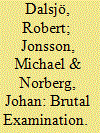

|
|
|
|
|
| Summary/Abstract |
Russian armed forces’ lacklustre performance in Ukraine has surprised military analysts. Shortcomings have included breakdowns in logistics, poor equipment and morale, abysmal communications, and muddled command and control, as well as a weak showing by the Russian Aerospace Forces, air defence, and cruise and ballistic missiles. Chief among the contributing factors are wishful political thinking, overreliance on esoteric doctrine and endemic corruption. War, however, brutally exposes peacetime cheating. Consequently, estimates of Russian military capabilities – in particular, for large-formation combined-arms operations, logistics, air defence and intangibles such as morale – need to be carefully reassessed. Earlier analyses of a Russia–NATO conflict appear to have overstated the challenge of defending Europe. Looking ahead, the conventional threat from Russia seems less daunting than previously thought, and the country faces a formidable task in repairing depleted capabilities. That said, President Vladimir Putin’s appetite for risk is greater than anticipated.
|
|
|
|
|
|
|
|
|
|
|
|
|
|
|
|
| 4 |
ID:
147809


|
|
|
|
|
| Summary/Abstract |
This article posits four key challenges to address the question as to why logistics reform in Communist-legacy defense institutions has been so slow. First, what is the conceptual foundation for logistics in these countries? Second, what is the general state of national logistics capabilities in these countries? Third, why has the reform of logistics in these post-Communist legacy defense institutions been so slow and superficial? Fourth, in an attempt to understand the problem better, what do legacy defense institutions need to do themselves in order to be able to adopt modern Western logistics concepts? Conversely, what do donor nations need to understand about these legacy logistics organizations the better to enable them to understand the immense gap that divides Communist from Western logistics concepts? In addressing these questions, the author will argue two points. First, logistics reform has been impeded to date by a lack of appreciation on the part of particularly Western officials that legacy logistics concepts could not be more antithetical to their Western counterparts. Second, reform of legacy logistics organizations will not follow from attention and resources directed at tactical-level formations and importing the expeditionary logistics concept. Rather, the causation of the continued inability to adopt Western logistics concepts can be found in national-level policy, financing, laws, and regulations that continue to enable the operation of legacy concepts.
|
|
|
|
|
|
|
|
|
|
|
|
|
|
|
|
| 5 |
ID:
165026


|
|
|
|
|
| Summary/Abstract |
For too long military cohesion scholars have focused on regular infantry forces. This article examines the impact of the Future Reserves 2020 (FR20) policy on cohesion, professionalism, and discipline among British reserve logisticians. In doing so, it makes three significant contributions to the cohesion literature. Firstly, addressing scholars’ almost exclusive focus on regular infantry, it presents the first academic study on cohesion in British reserve logistics forces. Secondly, in detailing how cohesion in these forces is based on interpersonal rather than professional bonds, it argues that the locus of cohesion and discipline in these forces is different to that recently identified in the regular professional infantry. Thirdly, the article argues that while FR20 is gradually changing many of British reserve norms, the organizational realities of reserve service continue to limit the policy's impact. The evidence presented may be theoretically applicable to other reserve and noncombat forces in future cohesion research.
|
|
|
|
|
|
|
|
|
|
|
|
|
|
|
|
| 6 |
ID:
013206
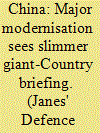

|
|
|
|
|
| Publication |
Dec 10, 1997.
|
| Description |
24-32
|
|
|
|
|
|
|
|
|
|
|
|
|
|
|
|
| 7 |
ID:
107173
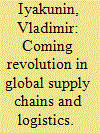

|
|
|
| 8 |
ID:
178616
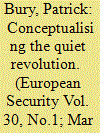

|
|
|
|
|
| Summary/Abstract |
There is growing evidence that simultaneous to the Revolution in Military Affairs (RMA), a less obvious, but equally profound, Revolution in Military Logistics (RML) has occurred that shapes and underpins western military effectiveness. However, there has been no conceptualisation of this RML nor its wider effect on Western force structures. This article addresses this gap in the security literature. Using an interdisciplinary literature review and case studies, it makes two central contributions: first, it details how western military logistics systems and practises have transformed following post-Fordist principles in the last two decades. In doing so, second, it contributes a major new conceptual framework to the military logistics and security studies literature. Finally, the implications of these processes for military effectiveness are examined, with the conclusion asserting that the cumulative effect of this post-Fordist RML has potentially increased western militaries’ strategic vulnerability.
|
|
|
|
|
|
|
|
|
|
|
|
|
|
|
|
| 9 |
ID:
144159
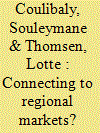

|
|
|
|
|
| Summary/Abstract |
Central Asian food processors face a number of constraints when they attempt to export to the region and beyond. The Central Asian economies in focus here are landlocked, and thus lack easy access to sea transport. In addition, the region's transport network was built to reinforce the interdependence of the then Soviet republics, while conflicting economic interests make cross-border cooperation difficult. Based on extensive fieldwork on infrastructure systems and firm export strategies, this paper identifies contemporary infrastructure and transportation issues within the Central Asian region, and makes a novel attempt to examine how these factors lead to challenges for local food processing producers trying to sell their products in the region and beyond.
|
|
|
|
|
|
|
|
|
|
|
|
|
|
|
|
| 10 |
ID:
013300
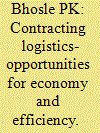

|
|
|
|
|
| Publication |
Oct-Dec 1997.
|
| Description |
514-30
|
|
|
|
|
|
|
|
|
|
|
|
|
|
|
|
| 11 |
ID:
113521
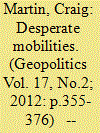

|
|
|
|
|
| Publication |
2012.
|
| Summary/Abstract |
This paper sets out to address the increasing strategic power of logistics management in the context of commodity and corporeal mobilities. In doing so it looks to the strategy of interconnectivity in order to address the management of legitimated mobilities. It is argued that the geopower of commodity mobility is premised on the infrastructural strength offered by logistics management, a form of spatial and temporal control that operates through increasingly territorialising means. However, given the infrastructural 'tension' that processes of standardisation have created, the paper also concerns the appropriation of commodity mobility networks for the purposes of illegitimated corporeal mobility. In part this is intended to develop the critiques of globalisation which challenged the image of transnational mobility networks as part of a borderless, boundless present typified most readily by the flows of information, capital and commodities. By contrast the 'desperate mobilities' of undocumented immigrants attests to the rather more tangled manifestations of mobility that many individuals have to traverse. In particular I focus on the fallibility of strategic sites within global commodity movement and the uses of 'extra-logistical knowledge'.
|
|
|
|
|
|
|
|
|
|
|
|
|
|
|
|
| 12 |
ID:
173003
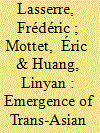

|
|
|
|
|
| Summary/Abstract |
Since 2011, freight transport rail links between China and Europe have been rapidly multiplying. Against all expectations, this commercial initiative, under the aegis of the Deutsche Bahn, has expanded significantly. The number of origin-destination pairs has increased, the number of trains has risen sharply, and both Chinese and European partners have far-reaching ambitions. The railways’ market share of trans-Asian freight is still low. However, rail link development projects have received a spectacular boost from the Belt and Road Initiative (BRI), resulting in the rapid expansion of volume, services offered, and the emergence of new rail infrastructure. Does this development, which needs to be examined more closely, represent a political tool for China? To what extent does the development of these rail links rely on a buoyant market? This article studies the development of rail services and infrastructure by means of a cross-analysis of a body of technical reports and publications by the transport sector’s professional press.
|
|
|
|
|
|
|
|
|
|
|
|
|
|
|
|
| 13 |
ID:
089318
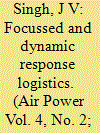

|
|
|
| 14 |
ID:
009787
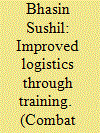

|
|
|
|
|
| Publication |
Dec 1995.
|
| Description |
31-36
|
|
|
|
|
|
|
|
|
|
|
|
|
|
|
|
| 15 |
ID:
151044
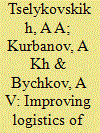

|
|
|
|
|
| Summary/Abstract |
This article examines a likely prospective trend in improving the logistical support of the Collective Security Forces of the Collective Security Treaty Organization during joint operations, namely, setting up a joint transportation and logistics holding. It analyzes the legal basis of establishing this kind of holding, its organizational forms and regional systems of unit control, as well as contemplating the potential positive effect from introducing this structure.
|
|
|
|
|
|
|
|
|
|
|
|
|
|
|
|
| 16 |
ID:
161918
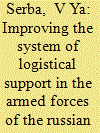

|
|
|
|
|
| Summary/Abstract |
This paper examines the current state of logistic support in the RF Armed Forces, highlighting the problems that plague this system, and offers likely ways of solving theme for individual kinds of logistical support.
|
|
|
|
|
|
|
|
|
|
|
|
|
|
|
|
| 17 |
ID:
021394
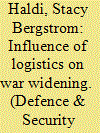

|
|
|
|
|
| Publication |
March 2002.
|
| Description |
3-14
|
|
|
|
|
|
|
|
|
|
|
|
|
|
|
|
| 18 |
ID:
052677
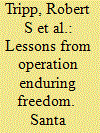

|
|
|
|
|
| Publication |
Santa Monica, Rand Corporation, 2004.
|
| Description |
xlvii, 119p.
|
| Standard Number |
0833035177
|
|
|
|
|
|
|
|
|
|
|
|
Copies: C:1/I:0,R:0,Q:0
Circulation
| Accession# | Call# | Current Location | Status | Policy | Location |
| 048315 | 958.1046/TRI 048315 | Main | On Shelf | General | |
|
|
|
|
| 19 |
ID:
139331
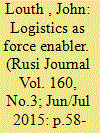

|
|
|
|
|
| Summary/Abstract |
The provision of defence logistics is determined by a complex relationship between public and private actors. John Louth explores the current debate, challenges and opportunities inherent in the defence logistics model in use in the UK, and the business management system required for the continued delivery of this key enabler of defence and security in the future.
|
|
|
|
|
|
|
|
|
|
|
|
|
|
|
|
| 20 |
ID:
014186
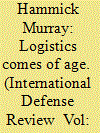

|
|
|
|
|
| Publication |
July 1992.
|
| Description |
665-673
|
|
|
|
|
|
|
|
|
|
|
|
|
|
|
|
|
|
|
|
|